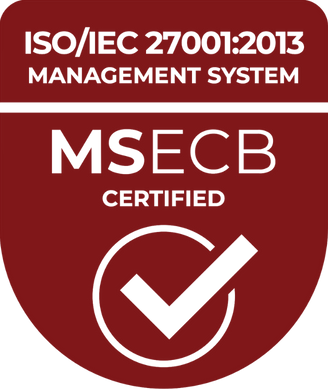Sales Processes in Consultant Companies

The most important task of the sales process is to propel the deal forwards with a clear vision of “the next step”. It should manage business opportunities and track consumer behaviour. Your sales people make sure that the deal is moving in the right direction and guide the client in their decision making. Consultant sales is all about relationships and how to maintain them. It is crucial to understand your clients’ challenges and thereby create win-win situations.
When you have clear processes for sales in your consultant company, it is easier to plan and follow up on your results.
Traditional Sales Processes
In the traditional sales process, it is primarily the sales rep. that generates leads. The most important tool for the sales person is to communicate, network, find leads, and propel the deal forwards. This is done by talking on the phone and by using social media while simultaneously working within and outside the organisation. The sales rep. has to be able to instil trust, and show that the company is relevant. The sales person has a number of ingredients to work with when building trust: references, consultant profiles, previous solutions, and content.
Examples of sales processes;

A sales process with several steps – even after the signed deal.
- Prospect – the first step is generating a new lead. The lead can come from other consultants, previous clients, marketing activities, events, the website, social media or from a cold call.
- Identify – what does the client need? This step often entails a meeting in person.
- Proposal – create a client customized offering.
- Communicate – present the offering to the client. Consultant interview, etc.
- Negotiation – price and contract negotiation.
- Agreement – the deal is closed, now it is time to deliver.
- Follow up – is the client satisfied with the work? Is there an opportunity to sell something more?
Another example of a sales process:

Many consultant companies have fewer steps in their sales process.
Different processes for different deals
If you are a larger consultant company, you probably have different processes for different clients. It can for example be meaningful to have different processes for:
- Turnkey commitments vs. resource deals
- Proposals via framework agreements.
- Processing a new client.
- Deals delivered by sub-consultants.
- Partners.
- Different areas of business.
- Different locations.

Example of a single process for proposals via existing framework agreements.
Synchronised Sales and Delivery
In modern consultant companies, the sales process is closely linked to delivery. By making it easy to access all skills and availability for the sales rep./delivery, it is easy to match business opportunities to the right skills. A lead in a consultant company should consequently be defined by the skills that are in demand. This makes it easier to present the right consultants to the right assignment.
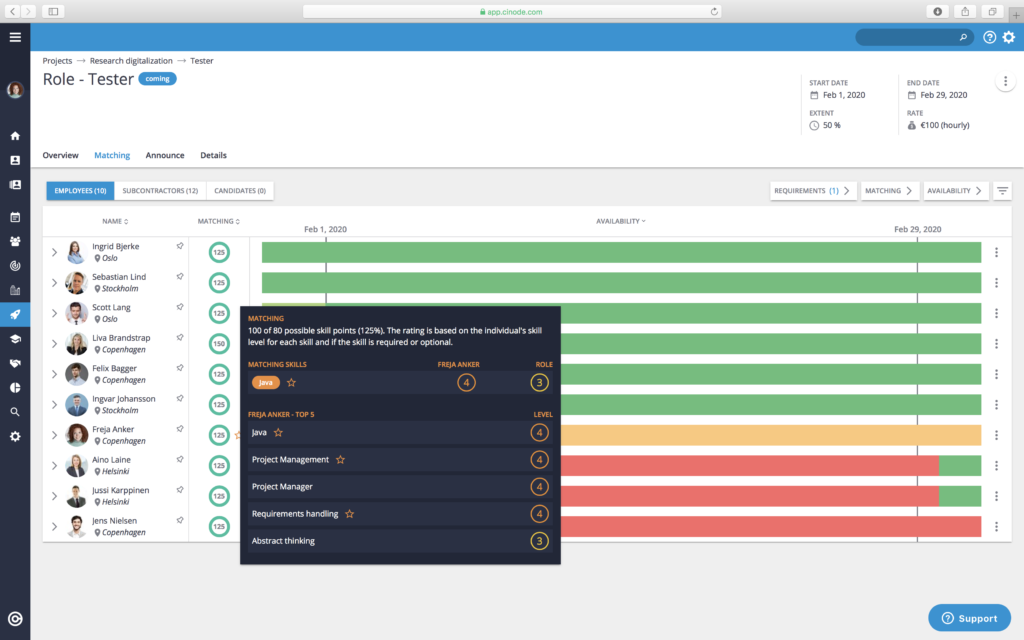
By preliminarily booking a consultant to an interesting assignment and then seeing these consultants in the utilization view, it is even easier to piece together the utilization puzzle. The sales process is closely connected to delivery to avoid skills that are not available being sold. By having an overview of the leads and skills needed and synchronizing them with available skills, lead times are made shorter. This leads to optimized sales and greater levels of utilization.

By working proactively in sales and making sure that everyone in the organization knows which consultants are available, you can avoid unnecessary time off for consultants.
Is the Entire Sales Force Utilized?
Consultant services are often sold via contacts. It not only the sales reps.’ contacts, but the entire company’s network. It is surprising how many consultant companies don’t use the entire sales force of the company. A consultant on assignment often gets to know about new challenges and assignments, but you need to be able to act on these opportunities.
Many consultants don’t think twice about leads coming their way – they simply think it’s the job of sales.
Fostering a culture where everyone helps generate leads can be the difference between a growing company and a dying company. By having the right tools you can enable a culture where everyone is a sales rep.
Are Your Consultants Aware of the Sales Process?
Instead of only letting sales use the CRM system you should enable everyone in the company to access the information and to add new leads.
Many successful consultant companies enable all employees to add leads and skills needs. Then it is up to the designated sales rep. to take the opportunity further.
Partners
Many consultant companies also choose to work with partners and brokers to optimize utilization, in both directions. Work that can’t be staffed is sent to the network of sub-consultants and other partners.
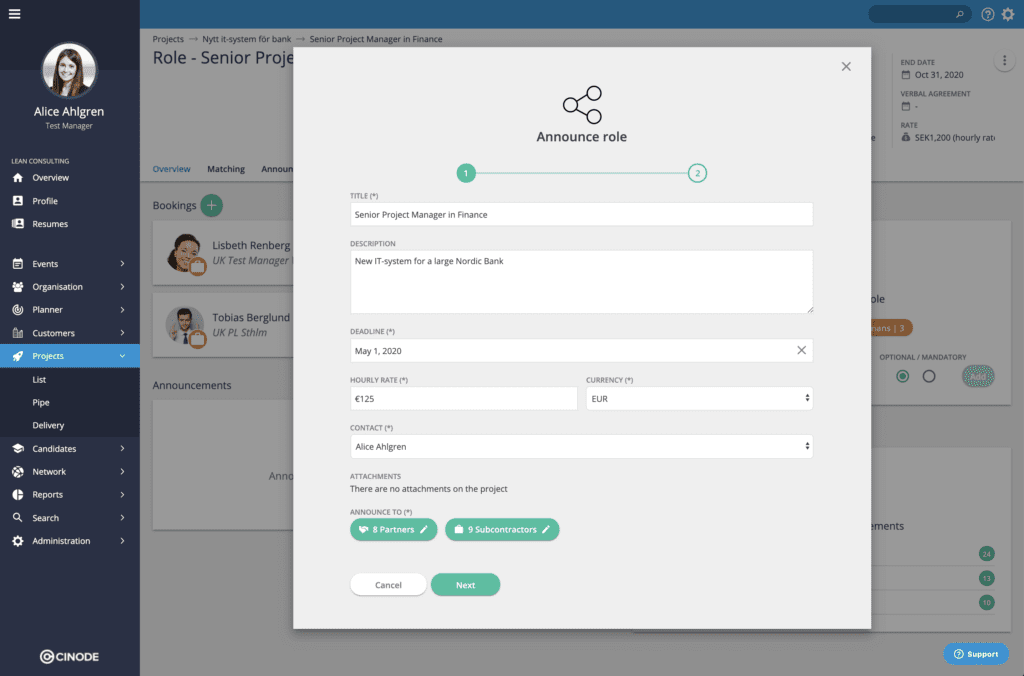
Consultants without an assignment are flagged for other networks or brokers.
Marketing and Sales – More Opportunities
Content marketing, Inbound Marketing, Marketing Automation… Buyer behaviour is changing at a pace that is difficult to keep up with. Standing out as a specialist and creating a digital relationship in an early phase with your prospects is more important now than ever before.
A sales process will often get initiated by a shared blog post on social media, leading to a value-filled article, a newsletter, a whitepaper, or a Front-End deal. Attract clients by showing how you are different from other companies, and most importantly, show that you know what you are doing and that you can solve the clients’ problems.
By fostering digital relationships, you get more “heated leads”. These are leads that are more susceptible to you when you call and when you want to book a meeting. This is what we do at Cinode with our newsletter, blog, and whitepapers. A lot of our lead generation also happens digitally, for example via LinkedIn.
KPIs for Feedback and Optimization
If you have a working sales process you can effortlessly keep track of important KPIs, such as utilization levels, margins, profits, hourly rates, number of leads, skills allocation etc. Read more about KPIs: 8 Crucial KPIs for Consultant Companies.
What does your sales process look like? Are you well suited for the future?

Johan Haeger - Head of Enterprise Sales, Cinode
Johan Haeger - Head of Enterprise Sales, Cinode
You may also like...
All posts
Oct 15 2025 · Economic Reports, Sales
Konsultkollen 2025: Growth Slows Significantly in the Swedish Consulting Sector
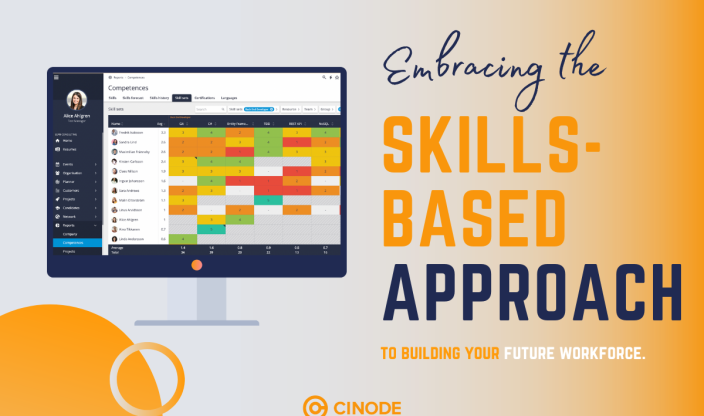
Apr 20 2023 · Consulting, Sales, Skills Management
How do you work more skills-based within your company?

Mar 23 2023 · Consulting, Sales, Skills Management
“If you sell competence, you always need to be on top of how you develop your skill set”

Feb 17 2022 · Consultant resumes, Consulting, Sales
Higher efficiency and utilization rate, and increased profitability

Sep 10 2019 · Cinode, Consultant resumes, Consulting, Sales
“There will always be a need to find the right resource extremely fast”

May 02 2019 · Entrepreneurship, Sales
Why growth and scalability are fundamental to consulting companies

Mar 27 2019 · Consulting, Entrepreneurship, Sales
Think 4 x Bigger and Grow your Consultancy Business
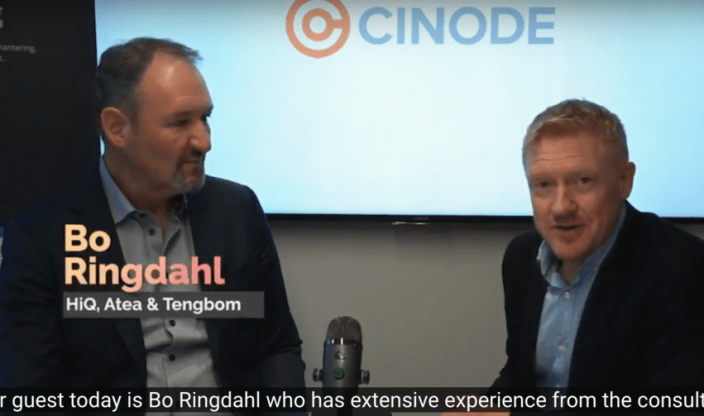
Jan 31 2019 · Consulting, Entrepreneurship, Marketing strategy, Sales, Video
How to climb the value chain as a consulting business

Nov 20 2018 · Consulting, Entrepreneurship, Sales
Compensation Models in Consulting Firms

Mar 07 2018 · Sales
